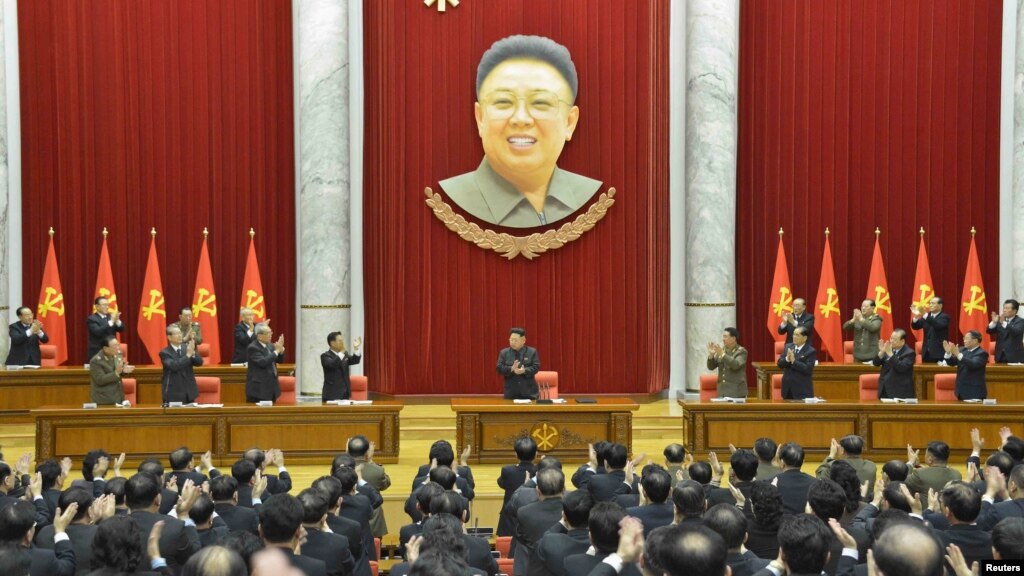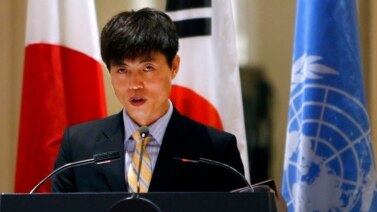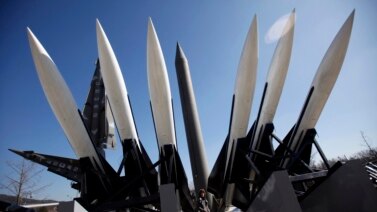
North Korea honored its former leader Kim Jong Il this week on what would have been his 73th birthday. Officials in the country praised Mr. Kim for his political skills and his opposition to the United States. But human rights groups want the man to be remembered for how he abused his people, including starving millions to death.
The celebration began Monday with a huge show of fireworks in the capital Pyongyang.
Kim Jong Il died in December, 2011, reportedly from a heart attack. He had ruled North Korea for 17 years. His birthday is now a three-day-long national holiday called the “Shining Star Festival.” It includes shows of sport and the distribution of free food.
Kim Jong Il’s son Kim Jong Un now rules the country.
Ahn Chan-il is the president of the World Institute for North Korea Studies. He says these kinds of celebrations are used to strengthen the Kim family’s control of the country.
He says North Korean officials give gifts to people during these celebrations to deepen their loyalty to the Kim family.
A leader of the Workers’ Party of Korea spoke to party, state and army officials. He praised Kim Jong Il for making North Korea, in his words, a “world-class military power and nuclear weapons state that no one dares provoke.”
International negotiations to end North Korea’s nuclear program failed during Kim Jong Il’s rule. This caused Western nations to establish severe diplomatic and economic restrictions on the country.
Many Westerners have laughed at Kim Jong Il for the stories North Korean officials tell about him. They say he wrote 1,500 books and three operas in three years. They say he played a perfect game of golf on his first attempt.
Phil Robertson works at Human Rights Watch. He says Kim Jong Il repressed and abused his people.
“Kim Jong Il ruled North Korea based on human rights abuses. His repression, his ruthlessness, his prioritizing of the maintenance of his power over the welfare of his people is his real legacy.”
Mr. Robertson says Kim Jong Il strengthened the country’s nuclear program in the 1990s while failing to deal with a severe shortage of food. Experts estimate almost 3.5 million North Koreans died as a result.
Mr. Robertson says the leader also kept in place a huge system of political prisons. Experts estimate the system now holds more than 100,000 North Koreans. They say it uses the prisoners as slaves, and tortures and executes them.
Some observers hoped Kim Jong Un would reform the country. He was educated outside the country and some experts thought he might hold some Western beliefs. But Mr. Robertson says Kim Jong Un is continuing his father’s policies.
In December, the U.N. Commission of Inquiry provided the United Nations Security Council with a report about North Korea. The report said the International Criminal Court should try North Korea’s leaders for crimes against humanity.
No action has been taken. But Mr. Robertson says activists will continue to fight the government in North Korea and demand its leaders be punished.
I’m Caty Weaver.
VOA Correspondent Brian Padden and Producer Youmi Kim reported this story from Seoul. Christopher Cruise wrote it in VOA Learning English. Caty Weaver edited the story.
Words in This Story
fireworks – n. a small device that explodes to make a display of light and noise
distribution – n. the act of giving or delivering something to people
provoke – v. to cause (a person or animal) to become angry, violent, etc.
opera – n. a kind of performance in which actors sing all or most of the words of a play with music performed by an orchestra
ruthless – adj. having no pity; cruel or merciless
legacy – n. something that happened in the past or that comes from someone in the past
What is your opinion of Kim Jong Il? We want to hear from you. Write your thoughts in the comments section.


